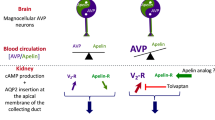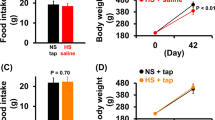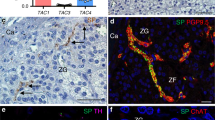Abstract
THIRST can be evoked within 1–2 min by intracarotid infusion of hypertonic NaCl. In contrast, the onset of a specific appetite for sodium salts as a result of rapid loss of body sodium is slow. A parotid fistula in naive sheep can produce a significant Na deficit (200–700 mmol) within 1–3 d but a Na appetite usually develops after 2–5 d (ref. 1). With large urinary water and Na loss induced by frusemide, water intake occurs within an hour but Na appetite is delayed until 24 h (ref. 2). Moreover, in the Na-depleted sheep or goats, increase in the Na concentration of cerebral arterial blood by 10–30 mmol l−1 by slow intracarotid infusion of 4 M NaCl for 7 min before or during presentation of Na solution does not reduce Na intake3,4. However, rapid intravenous infusion of significant amounts of isotonic and 2–4 M NaCl solutions in Na-deficient sheep substantially reduces Na appetite after 40–120 min5,6. In the rat, tissue fluid sequestration produced by subcutaneous polyethylene glycol injection causes water drinking within an hour, but onset of salt appetite is delayed by 6–10 h.7 This delay also occurs in salt appetite produced by peritoneal dialysis8, tourniquet release9 and formalin injection10,11. New data indicate the powerful effects of the hormones involved in the reproductive process in inducing salt appetite. With pregnancy and lactation in Na-replete rabbits, avid salt appetite develops with a daily turnover of 50% or more of extracellular fluid (ECF) Na (ref. 12). This is caused by the combined action of oestradiol, cortisol, ACTH, prolactin and oxytocin13. ACTH seems to act directly on the brain14. Recent experimental data provide new information on the central nervous system control mechanism. Weisinger et al.15 reported that in Na-depleted sheep, the systemic influx of Hypertonie NaCl significantly reduced motivation for salt within 10–20 min. In the light of these data, we decided to evaluate the effect on Na appetite of increasing the cerebrospinal fluid (CSF) Na concentration or osmolality in Na-deficient sheep. We now report the first experiments to show that it is feasible to induce salt appetite within an hour or less by a physiological procedure.
This is a preview of subscription content, access via your institution
Access options
Subscribe to this journal
Receive 51 print issues and online access
$199.00 per year
only $3.90 per issue
Buy this article
- Purchase on Springer Link
- Instant access to full article PDF
Prices may be subject to local taxes which are calculated during checkout
Similar content being viewed by others
References
Denton, D. A. Handbook of Physiology, Section 6 Vol. 1 (ed. Code, C. F.) Ch. 31 (American Physiological Society, Washington, 1967).
Zimmerman, M. B., Stricker, E. M. & Blaine, E. H. J. comp. Physiol. Psychol. 92, 501 (1978).
Beilharz, S., Bott, E., Denton, D. A. & Sabine, J. R. J. Physiol., Lond. 178, 80–91 (1965).
Baldwin, B. A. Physiol. Behav. 16, 59 (1976).
Beilharz, S. & Kay, R. N. B. J. Physiol., Lond. 165, 468–483 (1963).
Denton, D. A., Orchard, E. & Weller, S. Commun. behav. Biol. 6, 245–258 (1971).
Stricker, E. M. & Wolf, G. J. comp. Physiol. Psychol. 62, 275 (1966).
Ferreyra, M. & Chiaraviglio, E. Physiol. Behav. 19, 197 (1977).
Stricker, E. M. in Biological and Behavioural Aspects of Salt Intake (eds Kare, M., Bernard, R. & Fregly, M.) (Academic, New York, in the press).
Stricker, E. M. & Wolf, G. Ann. N. Y. Acad. Sci. 157, 553 (1969).
McCutcheon, B. & Levy, C. Physiol. Behav. 19, 197 (1977).
Denton, D. A. & Nelson, J. F. Endocrinology 88, 31–40 (1971).
Denton, D. A., McKinley, M. J., Nelson, J. F. & Weisinger, R. S. Acta endocr. 85, S212, 3–4 (1977).
Blaine, E. H., Covelli, M. D., Denton, D. A., Nelson, J. F. & Shulkes, A. A. Endocrinology 97, 793 (1975).
Weisinger, R. S., Denton, D. A. & McKinley, M. J. J. comp. Physiol. Psychol 92, 522 (1978).
Abraham, S. F. et al. Acta Endocr. 81, 120–132 (1976).
McKinley, M. J., Denton, D. A. & Weisinger, R. S. Brain Res. 141, 89–103 (1978).
Andersson, B. & Olsson, K. Proc. 4th Int. Congr. Endocr. 724, (Excerpta Medica, 1973).
Denton, D. A. Conditional Reflex 1, 144–170 (1966).
Douzou, P. & Maurel, P. Trans. biochem. Sci. 2, 14 (1977).
Denton, D. A. & Nelson, J. F. Endocrinology 103, 1880–1887 (1978).
Author information
Authors and Affiliations
Rights and permissions
About this article
Cite this article
WEISINGER, R., CONSIDINE, P., DENTON, D. et al. Rapid effect of change in cerebrospinal fluid sodium concentration on salt appetite. Nature 280, 490–491 (1979). https://doi.org/10.1038/280490a0
Received:
Accepted:
Published:
Issue Date:
DOI: https://doi.org/10.1038/280490a0
This article is cited by
-
The neural basis of homeostatic and anticipatory thirst
Nature Reviews Nephrology (2018)
-
Understanding the Two Faces of Low-Salt Intake
Current Hypertension Reports (2017)
-
Hydration Status Regulates Sodium Flux and Inflammatory Pathways through Epithelial Sodium Channel (ENaC) in the Skin
Journal of Investigative Dermatology (2015)
-
An N-terminal variant of Trpv1 channel is required for osmosensory transduction
Nature Neuroscience (2006)
Comments
By submitting a comment you agree to abide by our Terms and Community Guidelines. If you find something abusive or that does not comply with our terms or guidelines please flag it as inappropriate.



